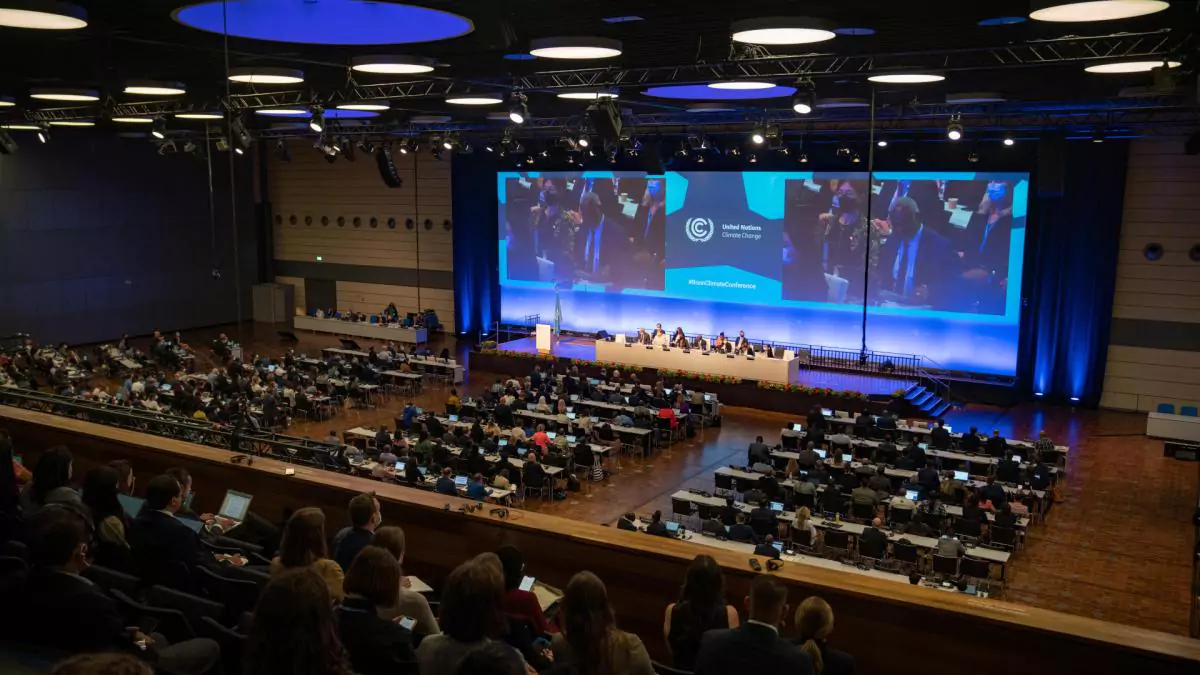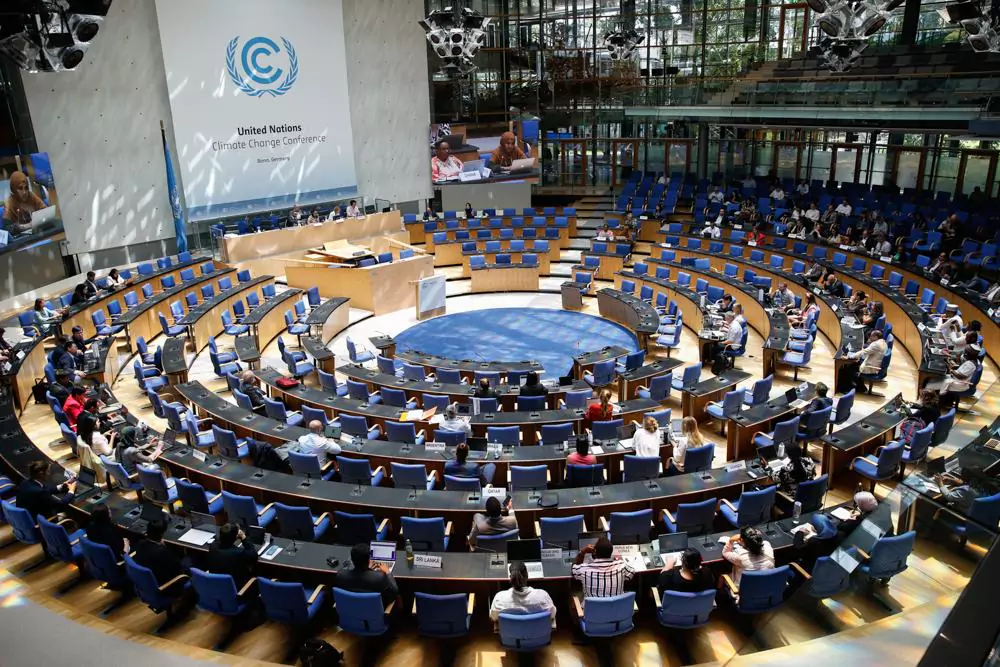Bonn Climate Conference 2024
What is the Bonn Climate Conference?
The Bonn Climate Conference 2024, officially known as the 58th Session of the UNFCCC Subsidiary Bodies (SB 58), took place in Bonn, Germany, from June 3–13, 2024. It is an important mid-year event under the United Nations Framework Convention on Climate Change (UNFCCC), serving as a platform for climate negotiations and laying the groundwork for decisions at COP29 (November 2024, Baku, Azerbaijan).
Key Focus Areas of Bonn Climate Conference 2024:
- Carbon Markets & Article 6 of the Paris Agreement – Rules for international carbon trading and emissions offsetting.
- Climate Finance for Developing Countries – Assessment of financial pledges, particularly the $100 billion climate finance goal.
- Adaptation Strategies for Climate-Vulnerable Nations – Enhancing resilience, operationalizing the Loss & Damage Fund, and financing adaptation projects.
Key Issues Discussed at Bonn Climate Conference 2024
Carbon Markets & Article 6 of the Paris Agreement
What Are Carbon Markets?
- Carbon markets allow countries & corporations to trade carbon credits, enabling cost-effective emission reductions.
- A carbon credit represents one ton of CO₂ equivalent reduced or removed from the atmosphere.
What is Article 6 of the Paris Agreement?
- Article 6 provides the framework for international cooperation on carbon markets.
- Article 6.2 – Allows countries to trade emission reductions bilaterally.
- Article 6.4 – Establishes a global carbon credit mechanism under the UN.
Major Carbon Market Issues Debated at Bonn:
- Ensuring Transparency & Avoiding Greenwashing: Preventing double counting of emission reductions and false carbon offset claims.
- Setting a Global Carbon Price: Developing fair pricing and regulations for carbon markets to avoid market manipulation.
- Role of Private Sector in Carbon Trading: Encouraging corporations to invest in emission reduction projects while ensuring accountability.
Example: The EU Carbon Border Adjustment Mechanism (CBAM)
- The European Union (EU) implemented CBAM to tax imported carbon-intensive goods, ensuring that foreign industries comply with EU climate policies.
- Developing nations argued that CBAM acts as a trade barrier, impacting exports from poorer nations.
Outcomes at Bonn:
- No final agreement on a global carbon pricing mechanism due to disagreements between developed and developing nations.
- Further negotiations on carbon credit verification rules & transparency measures were pushed to COP29.
Climate Finance & the $100 Billion Commitment
What is Climate Finance?
- Developed nations pledged to mobilize $100 billion annually by 2020 (extended to 2025) to support developing countries in climate action.
- Climate finance is crucial for:
- Mitigation: Investments in renewable energy, electric mobility, energy efficiency.
- Adaptation: Funding for coastal protection, climate-resilient agriculture, disaster management
Key Issues Debated at Bonn:
- Failure to Meet the $100 Billion Target: Developed countries have not fully delivered on their climate finance commitments.
- Beyond $100 Billion: Discussions on a post-2025 climate finance goal, estimated to be $200–400 billion annually.
- Private Sector Involvement: Encouraging banks & corporations to invest in green energy & climate resilience projects.
Example: The Loss & Damage Fund (COP27 Agreement)
- The Loss & Damage Fund, established at COP27 (Egypt, 2022), is designed to support climate-vulnerable nations affected by rising sea levels, cyclones, and droughts.
- However, funding mechanisms remain unclear, with developed countries hesitant to make long-term financial commitments.
Outcomes at Bonn:
- The US and EU committed to increasing climate finance contributions, but developing nations demanded legally binding commitments.
- COP29 further discussed defining a post-2025 finance framework.
Adaptation Strategies for Climate-Vulnerable Nations
Why is Adaptation Important?
- Over 3.5 billion people globally are vulnerable to climate disasters such as floods, cyclones, droughts, and wildfires.
- Early Warning Systems for natural disasters.
- Drought-resistant agriculture to ensure food security.
- Climate-resilient infrastructure (e.g., flood barriers, heat-resistant urban planning)
Example: Early Warning for All Initiative (UN Program)
- The UN announced a global early warning system to protect every country by 2027 from climate-related disasters.
- Bonn discussions focused on scaling up funding for early warning systems in developing nations.
Outcomes at Bonn:
- Developed nations supported adaptation policies but lacked concrete financial commitments.
- Stronger collaboration between UN agencies, development banks, and climate-vulnerable nations was proposed.
The Future of Global Climate Negotiations
Key Takeaways from Bonn Climate Conference 2024:
- Carbon markets are key to achieving net-zero emissions but need strong regulations to avoid greenwashing.
- Developed nations must deliver on their climate finance commitments to ensure equitable climate action.
- Stronger financial mechanisms for adaptation strategies are needed to protect vulnerable nations from climate disasters.
Future climate policies will require balancing economic interests with climate justice and sustainability goals.
Linking Bonn 2024 to Baku COP29
The Bonn Climate Conference 2024 (SB 58), held in Germany in June 2024, served as a technical and preparatory session for the COP29 Summit in Baku, Azerbaijan (November 2024). The discussions at Bonn set the foundation for key climate negotiations at COP29, particularly on:
- Carbon Markets & Article 6 of the Paris Agreement (Developing international carbon trading rules).
- Climate Finance & Loss & Damage Fund (Enhancing financial support for developing countries).
- Adaptation Strategies for Vulnerable Nations (Finalizing operational frameworks for global adaptation initiatives).
Discussions at Bonn Climate Conference 2024
The Bonn Climate Conference (SB 58) focused on unresolved climate issues before COP29. Its major role was to assess the progress of climate commitments made at COP28 (Dubai, 2023) and to shape the negotiating agenda for Baku COP29.
Carbon Markets & Article 6 of the Paris Agreement
Why Are Carbon Markets Important?
- Carbon markets allow countries & corporations to trade carbon credits to meet their climate goals cost-effectively.
- Article 6 of the Paris Agreement enables international carbon trading but requires clear governance rules.
Outcome at Bonn:
- No final consensus was reached due to disagreements between developed & developing nations.
- The final decision on global carbon market regulations was pushed to Baku COP29.

Climate Finance & the $100 Billion Commitment
Climate Finance – What Was Debated at Bonn?
- Developed countries had not met their $100 billion per year target, causing frustration among developing nations.
- Discussions at Bonn aimed at:
- up climate finance post-2025 (increasing pledges to $200–400 billion annually).
- Finalizing the structure of the Loss & Damage Fund (which was promised at COP27).
- Mobilizing private sector funding for climate adaptation projects.
Outcome at Bonn:
- No concrete financial commitments were made.
- Developing nations demanded legally binding climate finance pledges, which were referred to Baku COP29 for resolution.
Adaptation & Resilience for Climate-Vulnerable Nations
Why is Adaptation Critical?
- Over 3.5 billion people are at high risk from climate-related disasters (floods, droughts, heatwaves).
- Bonn discussions focused on:
- the Global Goal on Adaptation (GGA) – Making adaptation measurable and well-funded.
- the UN’s Early Warning for All Initiative (EW4All) – Ensuring disaster preparedness for every country by 2027.
- Climate-Resilient Infrastructure – Enhancing flood protection and heat-resistant city planning.
Outcome at Bonn:
- Developed nations supported adaptation measures but did not commit adequate financing.
- The UN Adaptation Fund’s expansion was left to be finalized at Baku COP29.
How Bonn Climate Conference Paved the Road to Baku COP29
Shaping the Climate Finance Debate for Baku
- At Bonn: Developing nations demanded greater financial commitments from developed nations but no binding agreement was reached.
- At Baku COP29: The final structure of the Loss & Damage Fund was agreed upon, ensuring that vulnerable nations receive direct financial support.
Carbon Market Regulations – Unfinished Work at Bonn
- At Bonn: Talks on carbon credit governance & pricing mechanisms were inconclusive.
- At Baku COP29: A framework for global carbon trading under Article 6 was finally adopted.
Strengthening Adaptation Finance at Baku
- At Bonn: Technical discussions on adaptation failed to secure concrete financial backing.
- At Baku COP29: The UN Adaptation Fund was expanded to $50 billion per year, with contributions from developed nations.
Example: How Bangladesh Used Bonn & Baku Decisions
- Bangladesh successfully lobbied for increased adaptation funding at Bonn.
- At Baku COP29, it secured direct financing for its cyclone shelters & climate-resilient agriculture.
Key Takeaways: The Bonn-Baku Climate Negotiation Process
How Bonn Laid the Foundation for Baku COP29:
| Key Issue | Discussions at Bonn (June 2024) | Final Decisions at Baku COP29 (November 2024) |
|---|---|---|
| Carbon Markets (Article 6) | No agreement on transparency & pricing | Global carbon trading framework adopted |
| Climate Finance ($100B Goal) | No new financial commitments made | Post-2025 climate finance target agreed |
| Loss & Damage Fund | Discussions on structure & access | Fully operationalized with funding |
| Adaptation Finance | Calls for more funding but no commitments | UN Adaptation Fund expanded to $50 billion per year |
| Early Warning Systems | Discussions on expansion | Fully funded for implementation by 2027 |
Key Outcomes from Bonn & Baku:
-
Bonn shaped the negotiation agenda for COP29, highlighting unresolved
issues.
COP29 delivered final agreements on finance, adaptation, and
carbon markets.
Climate justice for developing nations was a central theme
in both conferences.
The Bonn Climate Conference laid the technical groundwork for Baku COP29, ensuring that crucial climate finance, adaptation, and carbon trading frameworks were finalized at the global summit.












